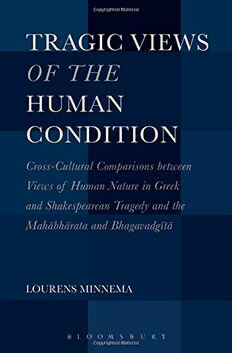
Tragic views of the human condition : cross-cultural comparisons between views of human nature in Greek and Shakespearean tragedy and the Mahābhārata and Bhagavadgītā PDF
Preview Tragic views of the human condition : cross-cultural comparisons between views of human nature in Greek and Shakespearean tragedy and the Mahābhārata and Bhagavadgītā
“The Kurukshetra Battle” from The Mahabharata. © The British Library Board: Or. 13180. Used with kind permission from the British Library. Tragic Views of the Human Condition ii Tragic Views of the Human Condition Cross-cultural comparisons between views of human nature in Greek and Shakespearean tragedy and - - - - the Mahabharata and Bhagavadg ta Lourens MinneMa NEW YORK • LONDON • NEW DELHI • SYDNEY Bloomsbury Academic An imprint of Bloomsbury Publishing Plc 175 Fifth Avenue 50 Bedford Square New York London NY 10010 WC1B 3DP USA UK www.bloomsbury.com First published 2013 © Lourens Minnema, 2013 All rights reserved. No part of this publication may be reproduced or transmitted in any form or by any means, electronic or mechanical, including photocopying, recording, or any information storage or retrieval system, without prior permission in writing from the publishers. No responsibility for loss caused to any individual or organization acting on or refraining from action as a result of the material in this publication can be accepted by Bloomsbury Academic or the author. Library of Congress Cataloging-in-Publication Data Minnema, Lourens, 1960– Tragic views of the human condition: cross-cultural comparisons between views of human nature in Greek and Shakespearean tragedy and the Mahabharata and Bhagavadgita/Lourens Minnema. pages cm Includes bibliographical references (pages ) and index. ISBN 978-1-4411-9424-4 (hardcover: alk. paper) 1. Tragedy–History and criticism. 2. Tragic, The. I. Title. PN1892.M56 2013 808.2’512–dc23 2012042522 ISBN HB: 978-1-4411-9424-4 ePub: 978-1-4411-0069-6 ePDF: 978-1-4411-5104-9 Typeset by Deanta Global Publishing Services, Chennai, India v For Thierno Ibrahima Bah Chaque homme porte en lui un monde composé de tout ce qu’il a vu et aimé et où il rentre sans cesse alors même qu’il parcourt et semble habiter un monde étranger. Chateaubriand, Voyage en Italie, Lettre troisième à M. Joubert Tivoli, 11 décembre 1803 Contents Acknowledgements xii 1 Introduction 1 1 Scope and key questions 1 2 Aspects of tragedy and embedded anthropological issues 2 3 Definition and cross-cultural applicability of the notion of the ‘tragic’ 5 4 The scholarly art of comparing cross-culturally 8 5 Main purpose of the comparative enterprise 10 2 Narrative aspects 11 Part I: Greek and Shakespearean issues 11 1 Introduction 11 2 Three tragic stories in particular 12 3 Specific plot patterns 15 4 A specific world view 25 5 Irony 29 6 Specific subjects 32 7 Conclusions 34 Part II: Indian and Hindu issues 36 1 Summary of the plot(s) of the Mah¯abh¯arata and Bhagavadg¯It¯a 36 2 The Mah¯abh¯arata’s specific plot pattern 39 3 Mah¯abh¯arata’s specific world view 43 4 The Bhagavadg¯It¯a’s plot pattern and world view 53 5 Conclusions 61 Part III: Cross-cultural comparisons 62 1 Introduction 62 2 Specific subjects 62 3 Specific plot patterns 64 4 A specific world view and the role of irony 69 viii Contents 3 Artistic–communicative aspects 75 Part I: Greek and Shakespearean issues 75 1 Introduction 75 2 A specific literary genre 75 3 Specific dialogues 79 4 A specific audience response 85 5 Conclusions 91 Part II: Indian and Hindu issues 93 1 Introduction 93 2 The Mah¯abh¯arata’s specific literary genre 93 3 The G¯It¯a’s specific dialogue 101 4 The G¯It¯a’s specific audience response 108 5 Conclusions 113 Part III: Cross-cultural comparisons 114 1 Introduction 114 2 Specific literary genres 114 3 Tragic mood and audience response 117 4 Specific dialogues 121 4 Socio-political aspects 127 Part I: Tragic and dramatic issues 127 1 Introduction 127 2 G. F. W. Hegel’s theory of tragedy 128 3 The state and the theatre as institutional sources of legitimation and conflict 130 4 Religion as an institutional source of legitimation and conflict 136 5 The family as an institutional source of legitimation and conflict 137 6 Social status defining the tragic genre 141 7 Conclusions 144 Part II: Indian and Hindu issues 146 1 Introduction 146 2 The state and the family as institutional sources of conflict and legitimation 147 3 Religion as an institutional source of legitimation and conflict 150 4 Conclusions 152
